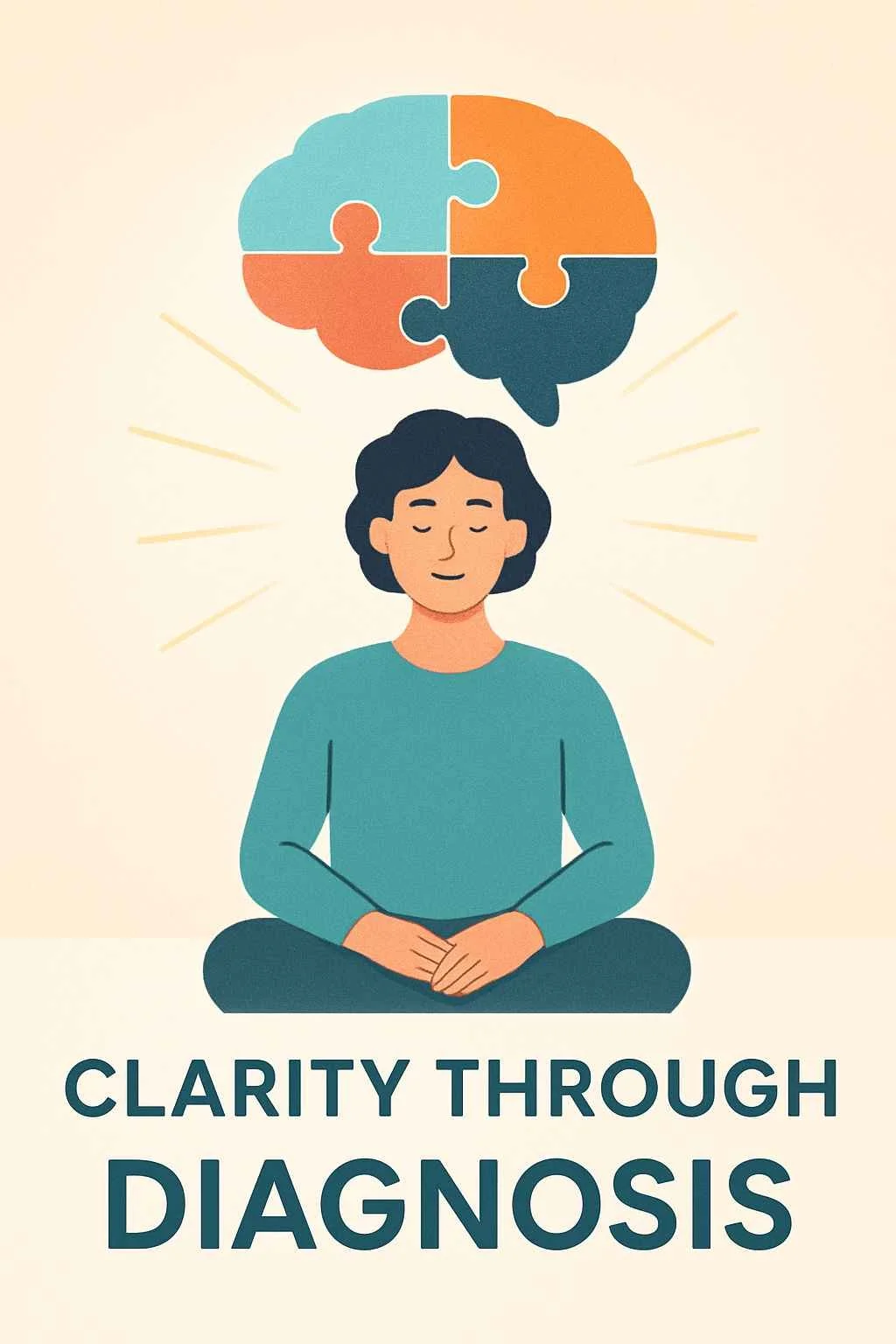Diagnosed with Autism as an Adult: Common Challenges and Solutions
Being diagnosed with autism as an adult can feel like a turning point. Many adults reach this diagnosis after years of confusion about their past experiences or why certain aspects of life have always felt different. This new understanding often brings relief, but it can also raise questions about what comes next.
Key Takeaways
An adult autism diagnosis often provides clarity, helping many people make sense of subtle traits and lifelong experiences that once felt confusing.
Certain challenges may appear in areas like social communication, sensory sensitivities, or managing organization and routines. These difficulties often do not prevent independence, but they can create stress in work, relationships, or daily tasks.
Helpful supports include peer groups, speech therapy focused on communication strategies, and professional guidance to build on strengths. Even small adjustments can make routines easier and social interactions more comfortable.
Self-acceptance, combined with practical strategies, helps autistic adults build confidence and thrive in both personal and professional settings.
Making Sense of an Adult Autism Diagnosis
Common Challenges and Autistic Traits in Adults
Solutions and Supports for Adults Diagnosed with Autism Spectrum Disorder (ASD)
Making Sense of an Adult Autism Diagnosis
Receiving a formal autism diagnosis as an adult often begins with noticing subtle but persistent traits. Many adults who pursue an evaluation function well in daily life but may recognize patterns such as sensitivity to certain environments, difficulty reading social cues, or a strong need for routines. These traits often felt manageable in childhood but became more noticeable in adulthood as responsibilities and relationships grew more complex.
The diagnostic process usually starts with a primary care physician who reviews your medical history and refers you to specialists for an autism assessment. This assessment often includes interviews, questionnaires, and conversations about early development and current experiences. While there is no single medical test for autism, professionals rely on patterns in these traits to provide a formal diagnosis.
For many adults, receiving a diagnosis can feel both validating and complicated. Some people find comfort in finally having an explanation for lifelong tendencies, while others need time to process what the label means for their identity. Both reactions are common and can exist together.
Common Challenges and Autistic Traits in Adults
Social Communication and Relationships
Many autistic adults with mild traits describe social interactions as tiring or confusing rather than impossible. Reading body language, facial expressions, or unspoken social rules may require extra effort, which can sometimes lead to misunderstandings at work or in close relationships.
Eye contact is one example. Some adults avoid it because it feels distracting, while others may use it in ways that seem unusual to others. Speech therapists can support communication by offering strategies that feel natural, while also helping adults adapt to social expectations in both professional and personal settings.
Sensory Differences
Sensory sensitivities in adults often appear as discomfort with bright lighting, crowded environments, or background noise. While these experiences are usually manageable, they can create stress during long workdays, social gatherings, or travel. Recognizing personal triggers helps reduce discomfort and makes it easier to request minor adjustments.
Changes such as wearing noise-canceling headphones, dimming lights, or choosing quieter meeting spaces often provide noticeable relief. Peer groups and therapy sessions can also offer new approaches for managing sensitivities in daily life.
Executive Functioning Skills
Executive functioning challenges can manifest as difficulties with planning, organization, or staying on task. For many high-functioning adults, these challenges are mild but can still create stress when juggling deadlines, household responsibilities, or long-term goals.
Practical tools, such as digital calendars, phone reminders, or breaking large projects into smaller steps, help reduce overwhelm. Working with a speech pathologist can also strengthen routines and communication strategies, making everyday tasks easier to manage.
Autism and Communication Difficulties in Adults
Check out our blog on autism and communication difficulties in adults for more information!
Solutions and Supports for Adults Diagnosed with Autism Spectrum Disorder (ASD)
Support Groups and Community
Support groups provide autistic adults with an opportunity to connect with others who share similar experiences. These spaces often feel reassuring because they offer understanding without judgment. Many groups also offer practical tips for managing relationships, navigating social situations, and coping with sensory sensitivities.
Speech Therapy for Social Communication
Social skills training can be particularly helpful for adults who want strategies to feel more at ease in social or professional settings. The focus is not on changing who a person is but on offering tools that support clearer communication and reduce stress.
Speech pathologists work on practical areas such as reading body language, improving conversational flow, and recognizing unspoken cues. These strategies build confidence while respecting individual differences, helping adults approach interactions in ways that feel authentic and sustainable.
Professional Guidance and Services
Health care professionals and autism organizations provide resources that help adults find the support they need. This may include assistance with assessments, workplace accommodations, or strategies for managing focus and routines. Structured guidance provides adults with a clearer path for addressing challenges while building on their strengths.
Frequently Asked Questions About Autism Diagnosis
1. How do you diagnose autism as an adult?
An autism diagnosis in adulthood typically begins with a formal assessment conducted by healthcare professionals. Often, a primary care physician reviews your history, inquires about autism symptoms, and refers you to specialists as needed.
The process typically involves interviews, questionnaires, and discussions about early development. There is no single medical test, so professionals look at patterns of traits and experiences to provide a diagnosis.
2. What are the common signs of autism in adults?
Autism in adults can show up in many ways. Some common traits include challenges with social communication, sensory sensitivities, and a strong need for routines or repetitive behaviors. Many autistic people also describe intense focus on specific interests, difficulty reading unspoken social cues, or struggles with organization and time management.
Each person’s experience is unique, and traits can range from very subtle to more noticeable.
3. Why are many adults diagnosed with autism later in life?
Many adults receive a formal diagnosis later because their traits were overlooked or misunderstood during childhood. Some people learned to mask their differences by copying social behaviors, while others grew up before autism was widely recognized.
As awareness has grown, more adults are seeking evaluations to finally bring clarity to lifelong experiences.
4. Can an adult autism diagnosis help with work or relationships?
An autism diagnosis can provide new insight into personal strengths and challenges, which often makes work and relationships easier to manage. Understanding these patterns can open doors to support, reasonable accommodations, and improved communication.
Many adults say a diagnosis helps them build healthier connections and reduces misunderstandings.
5. Is there a cure for autism spectrum disorder?
Autism is not something that needs to be cured. Instead, supports and strategies can help autistic adults manage challenges while celebrating their strengths. Options like speech therapy, support groups, and professional services can make daily life smoother.
For many, undergoing the diagnostic process encourages self-acceptance and helps them approach life with more confidence.
How Connected Speech Pathology Can Help
Connected Speech Pathology offers online support for autistic adults looking for practical strategies after receiving a diagnosis. Our speech-language pathologists focus on developing communication skills, building confidence in social interactions, and creating tools to manage daily stressors.
Communication coaching is individualized and focuses on helping autistic people strengthen their conversations, develop a better understanding of social cues, and employ strategies that feel authentic in real-life situations.
Our services are available online, making support more accessible and convenient. Sessions can address goals such as executive functioning, managing sensory differences, or improving relationships.
We work with adults who want to better recognize their strengths while also developing strategies that make everyday life feel easier and more sustainable.
Summary
Receiving an autism diagnosis as an adult often brings clarity and helps explain lifelong patterns. Many autistic adults experience challenges with social communication, sensory sensitivities, or executive functioning, but these experiences can be managed with the proper supports.
Practical strategies can help strengthen communication, deepen relationships, and reduce daily stress. A diagnosis does not change who you are. Instead, it can highlight your strengths and provide opportunities for growth, connection, and self-acceptance.
About the Author
Allison Geller is a communication coach, speech-language pathologist, and founder of Connected Speech Pathology, an international online practice providing professional communication coaching and speech therapy for children, teens, and adults. With more than two decades of experience, she has worked in medical and educational settings, published research on aphasia, and leads a team of specialists helping clients improve skills in public speaking, vocal presence, accent clarity, articulation, language, fluency, and interpersonal communication.








